
Imagine biting into a juicy burger, charred on the outside, a little pink on the inside. It’s flavorful and tender—the perfect piece of meat. Now imagine that hamburger patty coming into being inside a laboratory, built with the blood of a fetal cow. Still sound delicious? Or would you throw the burger down in disgust, immediately vowing to become a vegetarian?
Lab-grown meat is big business right now, with China signing a $300-million deal with Israel to manufacture lab-grown meat to cut back on raising cattle as a way of solving environmental challenges. Plus, companies across the United States are vying for the top spot in the world of curated meat.
But it could still be some time before you find lab-grown meat in San Francisco Bay Area grocery stores, and that’s not just because it’s going to take time to produce meat that passes the stringent eye of the FDA. Curious to see if San Francisco grocers were gearing up to stock their shelves with the petri-dish meat, we found a couple who were more skeptical.
Mark Squire, one of the founders of the Good Earth Natural Foods in Fairfax, said there’s no way he’d put meat grown in a lab on his grocery-store shelves.
“They’re saying at this point that a pound of meat would cost $600. It’s more pie in the sky right now, so who knows?” he said. “I have some serious questions about whether it’s ever going to be viable.”
Mark said he’s been around long enough that he’s watched humans mess with nature—by creating genetically modified crops, for example—and the results are never pretty.
“We are not paying attention to the long-term health impacts or the long-term environmental impacts of lab-grown meat,” he said. “We’re going down this road so fast that it makes your head spin. We’re starry-eyed, thinking we’re going to create new life forms, and that it’s all going to work out. It’s arrogant of us to think we can tinker with biological systems and have good outcomes. We really don’t have an understanding of just how complex they are.”
He thinks lab-grown meat should undergo rigorous and long-term testing before being made available to the public.
Lorenzo Rodriguez y Rios, store director for the Real Food Company in San Francisco, said he’s watching and waiting to see what happens with lab-grown meat, but he’s not ready to write it off just yet.
“Meat grown in a lab would help as far as reducing cattle grazing, but you have the potential of energy costs and issues from growing meat in a lab,” he said. “Maybe we wouldn’t need to use antibiotics since a lab is so sterile, but other things would be inserted into the meat for color, taste and texture.”
He said one good thing about lab-grown meat is that possibly E. coli would go away because we wouldn’t be butchering carcasses, and it would be safer as far as pesticides and cross-contamination. But “the flip side is that we don’t know—there are things that could happen in a lab that we’re just not aware of yet,” he said.
While he wouldn’t say no to selling lab-grown meat at Real Food grocery stores, he’d have to have a really good reason to put it on store shelves. Instead, he recommends trying vegetarian meat.
“I”m not going to lie—there’s a burger called the Beyond Burger that I had for the first time at the Veggie Grill in San Francisco, and I was in love,” he said. “As soon as distributors offer it, I will sell it.”
Meanwhile, Mark Squire believes the attention should be placed on a technology we know to be healthy: organic.
“We have a sophisticated and beautiful system called organic that we just don’t invest in,” he said. “If we apply science to that system, we can learn a whole lot and produce food more efficiently too.”
So if you’re not ready to put fetal bovine serum into your mouth just yet, maybe you’re better off taking a bite out of a Beyond Burger, buying grass-fed beef that’s grown within driving distance of your house or just going plain old vegetarian.
The cows—and Mother Earth—will thank you.







